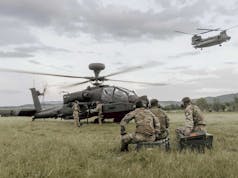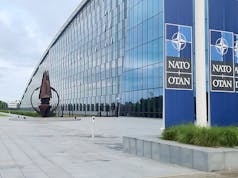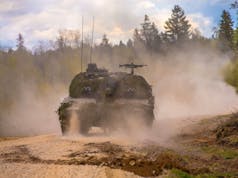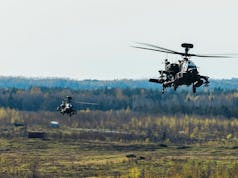The British Army say it is on course to hit recruitment targets as the number of applications rise.
“Record numbers of people are joining the Army as the latest data reveals it is on track to hit its recruitment target, the Recruiting Partnership Programme has announced today. Figures show that nearly 100 per cent of the target for new candidates to start basic training this year has been met, with seven weeks to go until the end of the recruiting period. This comes as it is revealed that over 100,000 people applied to join the Army since April, an increase of at least 5 per cent over the same period last year and the highest in recent years.”
Minister for the Armed Forces Anne-Marie Trevelyan said:
“I’m delighted to see the improvements in the Army’s recruitment figures over the last recruiting year, which is a result of both the Army and Capita working together to deliver the talent and numbers we need into the British Army. We remain committed to ensuring that the British Army has the right people, in the right roles, in the right timeframe to deliver on all our operational commitments.”
The results follow the new recruitment campaign for 2020 unveiled last month. Drawing on research by the Prince’s Trust and Deloitte which shows that young people believe a lack of self-confidence is holding them back, ‘Army confidence lasts a lifetime’ highlights the unique and deep-rooted confidence that an Army career offers.
Cath Possamai Chief Executive Officer of British Army Recruiting Group said:
“Capita’s partnership with the Army is on course to hit the full target of soldier recruits this year. This follows a complete re-set of the partnership over the past two years, which has seen us work incredibly closely with the Army. This has resulted in a major, successful turnaround of the contract. We will continue to make improvements to the partnership so that this is not just one strong year. We want to perform at consistently high levels, making sure that the Army has a recruiting process and system that is fit for the 21st Century.”













We should have a minimum standing count enforced. 100,000 seems like the best number.
Thankfully we’re leaving the EU so we’re not joining the EU Army. Time to stand on our own two feet and 75,000 is ridiculously pitiful.
I thought the number was set at 82,000 George?
That said, around 100,000 (with the new army reserve structure and numbers) seems sensible moving forward.
I would also increase the size of the Royal Marines to 10,000, to allow them to be deployed at brigade level and still develop the company sized ‘WW2 Commando style’ raiding force concept that’s currently being pushed.
The RM Corps are highly likely to be the first boots on the ground when required, as we develop our new post BREXIT world position and have to protect/ work closely with new partners.
They are the ideal solution to a highly deployable and capable force, for soft and when nessasary, hard power.
Could’t agree with you more John. The RM are a vital national asset and numbers should be increased.
82,000 is the “workforce requirement”. The actual full time trade trained strength at 1 Jan this year was 73,670. The army reserve requirement is 30,100 and trained strength is 27,240.
I agree we should have a minimum put into law to protect our nation, 100,000 trained full time and 50,000 reserves that are active and fit perfect into the army. Then we have our second reserves or ex army personnel liable to be called up if needed and that used to number more than 100,000 but they stopped including those figures in data and websites ect for some reason. We should have basic equipment for far more soldiers than we have because if a big war kicks off we will need replacements for the killed.
Or maybe the money would be better spent on cyber security, and combating at home terrorism, and how we tackle threats such as this coronavirus. These are the real world problems. I’m all for a well funded, and a highly capable and deployable Army, but we have to focus our money on the capabilities we really need, rather then making our head count look impressive. There are lots of Army’s around the world with very impressive numbers of personnel and tanks ect on paper, but in practice, are next to useless.
Shhh, it’s all fantasy fleets round here.
Need some form of Home Guard to secure the home base; deployable only in the UK. The Norwegians had or still have one.
And We are part of Nato so will never stand alone. And the EU working together to protect itself is fine with me it’ll only make Europe stronger and more powerfull, and everyone’s fine with a NATO army but not EU why?
I think mainly because it dilutes a NATO, already weak from lack of European spending, all an EU military structure will do is spread this minimum resource even further.
Hardly. Anti-EU army feelings are rooted firmly in British Nationalism, and has little to do with actual EU spending and strength of NATO.
NATO is not developing into superstate but the EU is. Ultimately in the worst case scenario with QMV U.K. forces could have been deployed against the will of parliament. Not so much British nationalism but a rejection by a majority of UK citizens based on 40+ years of half truths at best of where U.K. politicians were taking this country. It was bad enough that we had our own politicians committing our forces in open ended military adventures without further complicating the matter.
I’ve got new for you, 51% of two thirds isn’t a majority.
Thank you for such an enlightening response.
Well the 51% of the those who could be bothered to vote is a majority.
An Eu army will be a complete farce, history is littered with France, Germany, Italy, Spain disagreeing on numerous military projects yet alone actually taking decisive action together. For them to have an integrated common force would cost hundreds of billions across all EU states and if say the Russian bear did come a knocking by time they agreed on how to respond Russia would have achieved its aim anyways.
British Nationalism, well yes, I make no apologies for being proud of our country, we are now an independent nation after all.
I certainly think Great Britain is worth far more than being a tiny star on someone else’s flag….
Most of the countries in the EU are also in NATO, they don’t spend enough as it is, that’s a well proven fact.
If you add an additional level of EU bureaucracy (taking its share of already inadequate national allocated defence money) to this sorry state of affairs, you will end up with a right mess.
It’s not rocket science, just the EU’s natural condition of wanting to control everything under its sphere of influence.
Member states national military capability, is just next on the list….
^ case in point of europhobia being the main driver of Britons not wanting EU defence structures in place.
NATO is largely made up of European nations and most of the U.K. electorate support it. We have as of today forces in several mainland European countries and as a good example of a longstanding bilateral relationship are currently deploying RMs as part of the UKNL landing force in Norway. We are also supporting France in Africa with troops and air assets. So where is this rabid europhobia because all I see is a rejection of political construct called the EU.
^ case in point of a re-moaner, way behind behind the curve, who would happily surrender everything to the EU superstate.
It’s not just about the military spend aspect and bureaucracy it’s more to do with geopolitics, NATO is a Cold War relic ran by the US, you could argue it’s main purpose is to be a tool of the US to keep Russia in check, the EU seems to be differing from the US on a number of things especially under Trump, but the anti Russian feeling in the US deep state runs deep across dems and republicans, so when Trump goes it will hardly change
Merkel and others recently have said that Europe needs to rely on itself, the EU has all the ingredients of a superpower except military, it has the population and the GDP, it is turning into a superstate and good luck to them, it’s not something I want Britain to be part of at the moment but FairPlay to them, they would be crazy not to push for a military when it already has all those ingredients, wants some force to back up it’s diplomacy, and wants Europe instead to focus its military on an organisation that has Europe at heart, and is run by Europeans, and that is not NATO
That’s not to say Britain won’t be part of a superstate in the future because I think it will, just not a European one, most likely an Anglo superstate of some kind, nothing will stop countries merging in the future, just look at the past as an example, throughout history flags have gone and turned into something else, civilisation has always merged into something bigger, globalisation has already started and it can’t be stopped, it’s the most efficient way of governing, sharing of resources and centralisation of power, that’s why businesses keep merging, a lot of people think in the next 50 to hundred years the globe will consist of 5-7 superstates
In fact more to do with not duplicating command and combat structure which are already in position with NATO. An EU force would need to operate outside of the NATO remit if needed and therefore unnecessary and expensive/wasteful duplication of force structure. Nothing to do with British nationalism in my eyes.
NATO Wasn’t with us in 82, nor was it with America in Panama. You cant hinge your defence on piece of paper. 2nd NATO isn’t looking to make its own army and is as its foundations a defence organisation. The EU is supposed to be a trade group and its idea of an EU army is to take all nations military assist.
Except I don’t believe nato itself has it’s own army while the EU has the Eurocorps
Eurocorps consists of forces loaned to that formation by member states, they’re still members of their respective armies… oh and NATO does have forces directly subordinated to its command, they just usually are air assets not ground ones.
There has never been any prospect of the EU forcing Britain to join an EU armed force. It simply wasn’t a prospect.
We certainly cannot meet our defence needs from our resources alone, or “stand on our own two feet” as you put it. British defence policy is driven by the need to work in concert with NATO allies if we are to ever meet our national defence interests.
Regards.
The army is not growing from 82,000 to 100,000. Chance would be a fitne thing. If anything the Govt is likely to reduce the size of the army in next years defence review. The article mentioned 100,000 applicants. The army might take 10,000 of them?
Is there any news on how RN recruitment is going? It would be good to get more hulls operational…
RN/RM recruitment for 2019 was 3,481, up from 3,088 for 2018. However, full time trained strength is down to 28,890 from 29,100. Workforce requirement is 30,630.
Hi,
Thanks… very informative.
Which is the biggest problem here recruitment, re-fit or both?
retention is always the biggest issue. You want to train them and keep them.
The RN and RM recruitment adverts are bloody good! That helps projecting yourself in a good way. Army ads are still pretty tosh, and army recruitment is up due to getting the Ghurkhas that have signed off back in board. Here’s hoping all 3 services recruitment is on the up.
I bet it’s the extra Gurkhas that have made that possible.
Cam, I think you mean the increase in army recruitment is the extra Gurkhas. Excluding Gurkhas, UK regular army recruitment was 9,743 in 2019, up from 5,779 in 2018. The minister, I think, is referring to 3 quarters of 2019 for a year to end in April this year – so not quite the same figures.
The hardest problem is keeping people in beyond 4 or 5 years service. The downside of having record low unemployment, civi street becomes more tempting to those who wish to be home every night, and lead a more normal life. Service life can be awesome for a single 20 something year old, but once you hit your 30’s, and wifes and kids come along, the thought of a 6 month deployment can loose it’s appeal.